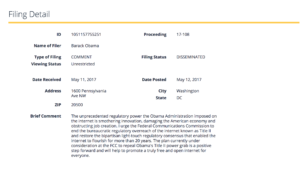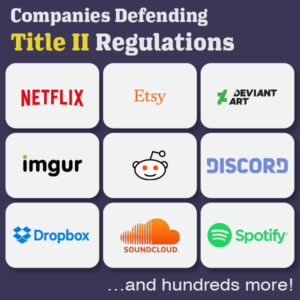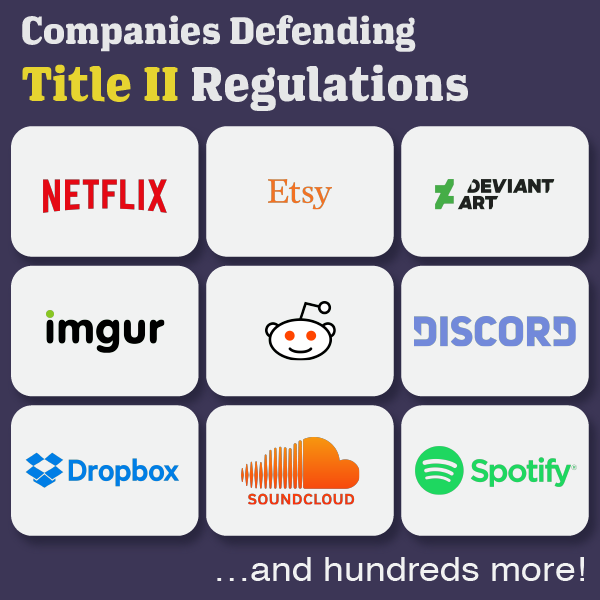Battle For The Net Video Bumper from FFTF on Vimeo.
Shelby Clayton
Layout Editor
slclayton@lc.edu
2017 has hit the United States hard, and it looks like its going out kicking and screaming. On November 21st, FCC chairman Ajit Pai revealed his plans to repeal Title II regulations that safe keep Net Neutrality. December 14th saw a 2 to 1 vote in favor of repealing it’s utility status and thusly striking a huge blow in what we know as the free market that is the internet.
This is not the first time America has come to blows with the possibility of the repeal of net neutrality in 2014. The FCC proposed “Internet fast lanes and slow lanes” back in 2014,meaning that Internet Service Providers (ISP’s) could speed up or slow down connection speeds to certain websites. People fear that the repeal of Title II regulations could mean that companies can pay ISP’s for premium speeds to allow for faster connections. This can hurt smaller companies who cannot afford faster connections, and ISP’s can even block certain sites entirely. If this happens, the internet will no longer be a free market. Big corporations will thrive like they will always have whilst snuffing out smaller competition. The FCC claims that no one can for sure know how this will affect the internet, despite the warnings of the creators of the internet themselves speaking out against the repeal. Tim Berners-Lee, the creator of the World Wide Web, has stated the the internet should be a “permissionless space for creativity, innovation and free expression,” and that “Gas is a utility, so is clean water, and connectivity should be too”. Steve Wozniak, a co-founder of Apple stated,
“Look who our president is going to look to for advice — and the advice he’s going to get is, “Let us rule, let us rule the internet, and let us have lower taxes.” And that just fights against the little guy.”
The FCC faced a remarkable amount of backlash in 2015 when attacks on net neutrality began, receiving 3.7 million public comments. Only 1% of these comments were clearly opposed to net neutrality. On February 26th of 2015, The FCC introduced “Title II Net Neutrality Rules” in a 3-2 ruling favoring net neutrality.

Comparing the backlash in 2014 to the amount in 2017 would be like comparing a snowflake to an avalanche. 5 million people sent comments to the FCC, making up 99.3 percent of the total comments the FCC has received since reopening comments to the public. However, this avalanche could be man-made. It’s reported that 2 million people, alive and deceased, were impersonated on posts made to the FCC, including posts that were against net neutrality. One of these posts against Obama era Title II regulations was supposedly the 44th President himself, Barack Obama. Obama purportedly stated that the repeal of his own “power grab” is a step in the right direction. The FCC has failed to acknowledge any attempts to investigate the fake comments.

Actions are being made to combat the decision to repeal net neutrality. Freepress.net, a nonpartisan organization who fights for the right of open internet, stop runaway media, and protects freedom of press, are making plans to sue the FCC. They’ve started a fun to begin legal actions, stating, “We intend to sue the FCC on the basis of its broken process, deeply flawed legal reasoning, willful rejection of evidence that contradicts its preordained conclusions, and absolute disregard for public input. We have a very strong case in court”. They have met 42% of their $100,000 goal. Another site, battleforthenet.com has created widgets to put on sights that help directly email or call congress, they display senators who are for, against, or undecided on net neutrality, as well with links to contact each one. They also display which companies who are anti-net neutrality and those companies that are for the title II regulations. Comcast, Verizon, AT&T, and Spectrum are the big four against net neutrality, and companies like; Netflix, Vimeo, Reddit, and Kickstarter and many more are against it.
“So why should I care about Net Neutrality?”
Are you a large corporation that could gain millions from other companies by having them pay to keep their bandwidth speed the same? No? Then you should care! Lately, social media has been aflutter with posts from communities of color about social injustice. Many movements and protests gained significant traction with the help of the internet. ISP’s can act as a gatekeeper and potentially block users and stop movements they disagree with before they can gain traction, effectively silencing communities of color. Along with this, big corporations can also rip vital platforms out from small businesses. Companies can throttle small businesses and entrepreneurs who need the internet to bring awareness to their brand.
So how can we the people have a say in net neutrality after the FCC blatantly disregarded our opinions? All hope is not lost for Net Neutrality. There is still a chance for Congress to overrule the FCC vote. It’s important for us to contact your members of congress to make sure they vote for net neutrality. You can do so by visiting battleforthenet.com. States also can help fight back by suing the FCC, several states have signed on to do so. States such as; California, Delaware, Hawaii, Illinois, Iowa, Kentucky, Maine, Maryland, Massachusetts, Mississippi, North Carolina, Oregon, Pennsylvania, Vermont, Virginia, and Washington have joined the fight. For other states that have not joined it is important to contact the state attorney to voice your opinions on suing the FCC. States can promote net neutrality on a local level by providing incentives to ISP’s to stay neutral, or refuse or hinder ISP’s that are not neutral. Some states have jurisdiction of their power lines and can flat out refuse to let certain ISP’s use their lines if they do not adhere to the states wishes.
Contacting your representatives can make a difference, they see you! Make yourself heard!
My representative responded after I texted RESIST to 50409. Keep pushing to protect #netneutrality pic.twitter.com/LvzGFVgKvy
— Hannah Pahos (@hannahpahos16) December 27, 2017




